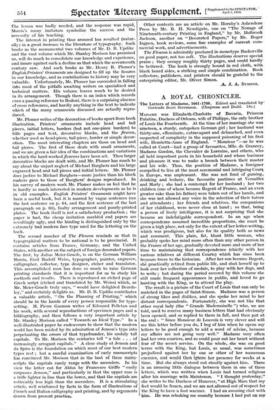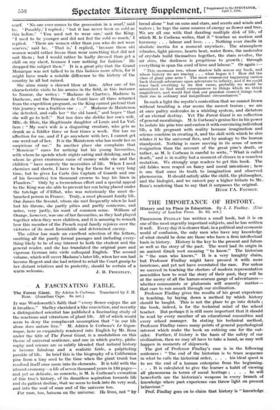A ROYAL CHRONICLER.
MADAME was Elizabeth-Charlotte of Bavaria, Princess Palatine, Duchess of Orleans, wife of Philippe, the only brother of Louis the Fourteenth. At the time of her marriage she was nineteen, a sturdy, outspoken German girl ; her husband was thirty-one, effeminate, extravagant and debauched, and even suspected of complicity in the supposed poisoning of his first wife, Henrietta-Anne of England. " Monsieur "—as he was called at Court—had a group of favourites, Mlle. de Graneey, Madame Gordon, the Chevalier de Lorraine, and others, who all held important posts in his household and whose business and pleasure it was to make a breach between their master and his wife. Thus, the position of Madame, a foreigner compelled to live at the most ceremonial and intriguing Court in Europe, was unpleasant. She was not fond of gaming, drinking and lechery, the favourite pastimes at Versailles and Manly ; she had a contempt for her husband ; her two children (one of whom became Regent of France, and an even greater rake than his father) were taken out of her hands, and she was not allowed any voice in the selection of their tutors and attendants ; her friends and relatives, the companions of her childhood, were never close at hand ; so that, being a person of lively intelligence, it is not surprising that -she became an indefatigable correspondent. In an age when correspondence assumed incredible proportions, she must be given a high place, not only for the extent of her letter-writing, which was prodigious, but also for its quality both as news and comment. This plain, fat, blunt little woman, who probably spoke her mind more often than any other person in the France of her age, gradually devoted more and more of her time to maintaining that correspondence (chiefly with her various relatives at different Courts) which has since been treasure trove to the historian. After her son became Regent, she practically retired from public life, and shut herself up to look over her collection of medals, to play with her dogs, and to write ; but during the period covered by this volume she still made frequent appearances in public, and loved to go hunting with the King, or to attend the play.
The result is a picture of the Court of Louis that can only be matched in the pages of Saint-Simon. Madame was a person of strong likes and dislikes, and she spoke her mind to her distant correspondents. Fortunately, she was not like that other royal lady (the " Grande Mademoiselle ") who, we are told, used to receive many business letters that had obviously been opened, and so replied to them in full, and then put at the end " Since Monsieur de Louvois is very clever and will see this letter before you do, I beg of him when he opens my letters to be good enough to add a word of advice, because my affairs are not going very well." Madame very often had her own couriers, and so could pour out her heart without fear of the secret service. On the whole, she was on good terms with the King, but Louis, as usual, was sometimes prejudiced against her by one or other of her numerous enemies, and would then ignore her presence for weeks at a time. But she always stood out stoutly against him. There is an amusing little dialogue between them in one of these letters, which was written when Louis had turned religious after his marriage with Maintenon. " I thought yesterday," she writes to the Duchess of Hanover, "at High Mass that my feet would be frozen, and we are not allowed out of respect for the King to have a foot warmer. I had an amusing chat with him. He was rebuking me soundly because I had put on my
scarf. ` No one ever comes to the procession in a scarf,' said he. ` Possibly,' I replied ; but it has never been as cold as this before." You used not to wear one,' said the King. ' I used to be younger and did not feel the cold so much,' I replied. "There are women older than you who do not wear scarves,' said he. ` That is,' I replied, ` because these old women would rather freeze than wear something that did not suit them ; but I would rather be badly dressed than get a chill on my chest, because I care nothing for fashion.' He dropped the subject then." It is a great pity that the Grand Monarque was not talked to in this fashion more often, for it might have made a notable difference to the history of the country he all but ruined.
She aims many a shrewd blow at him. After one of his characteristic visits to his armies in the field, in this instance to Namur, she writes : " Madame de Chartres, Madame la Duchesse, and the Princesse de Conti have all three returned from the expedition pregnant, so the King cannot pretend that this journey was a fruitless one . . ." Madame de Maintenon she detested, and calls her " the old bawd," and hopes " that she will go to hell." Not less does she dislike her son's wife, Mlle. de Blois, the illegitimate daughter of Louis and La Val- Here : " My son's wife is a disgusting creature, who gets as drunk as a fiddler three or four times a week. She has no affection for me, and if I go anywhere with her, I cannot get one word out of her. It is the Maintenon who has made her so suspicious of me." In another place she complains that " Monsieur " cares for nothing but his young favourites, with whom he spends whole nights eating and drinking, and to whom he gives enormous sums of money while she and the children " have scarcely the necessities of life. When I need chemises and sheets, I have to beg for them for a very long time, but he gives La Carte (his Captain of Guards and one of his favourites) ten thousand crowns to buy his linen in Flanders." Only by a tremendous effort and a special appeal to the King was she able to prevent her son being placed under the tutelage of d'Effiat, who was notoriously the most de- bauched person in France. Truly, a most pleasant family life. Our James the Second, whom she met frequently when he had lost his throne, she partly pities and partly contemns, and notes, very justly, his want of common sense. William of Orange, however, was one of her favourites, as they had played together when they were children, and it is amusing to remark how this member of the French royal family rejoices over the victories of its most formidable and determined enemy.
The editor has made an excellent selection of the letters, omitting all the purely formal passages and including every- thing likely to be of any interest to both the student and the general reader, and she has translated the original pure and vigorous German into virile colloquial English. The second volume, which will cover Madame's later life, when her son had become Regent and she had retired to retail the Court gossip to her distant relatives and to posterity, should be certain of a
warm welcome.
J. B. PRIESTLEY.



























































 Previous page
Previous page